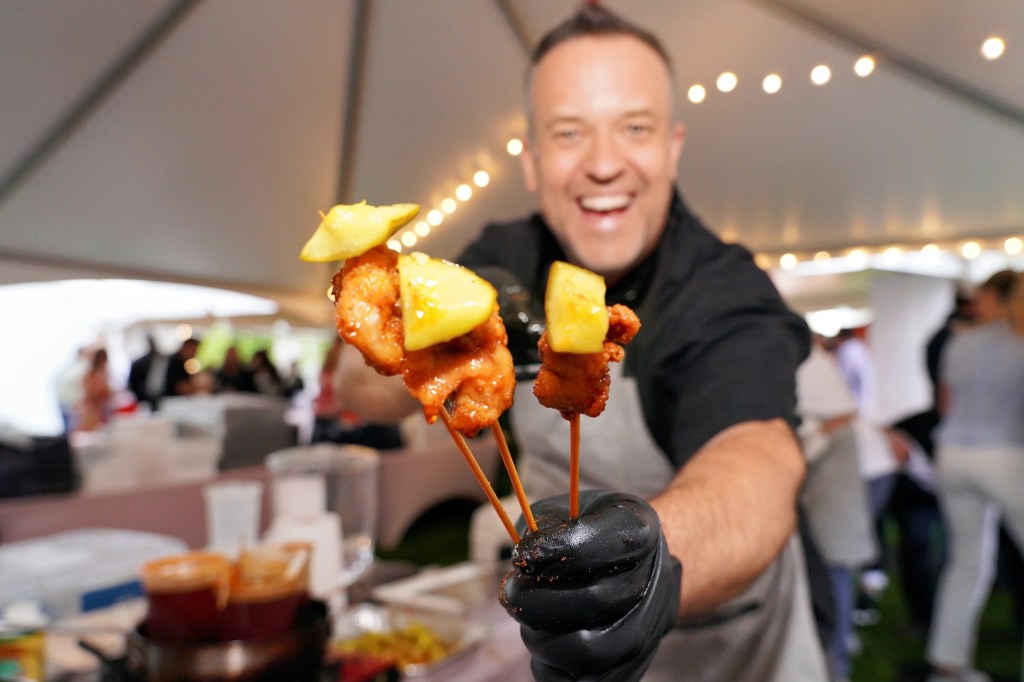Hampton Theatre Company Delivers a Piercing 'Who's Afraid of Virginia Woolf?'

An unflinching vivisection of an American marriage, Edward Albee’s Who’s Afraid of Virginia Woolf? is one of the most monumental works ever written for the American stage.
As a booze-addled night at a New England college professor’s house morphs into what amounts to a war game masquerading as a social event, a young couple attempts to make sense of the cryptic storytelling and vitriol oozing from their middle-aged hosts.
The action begins when a newly-hired faculty member and his wife join the daughter of the college’s president and her husband, a history professor, for a nightcap. The entire play takes place in and around the older couple’s living room over the course of a single late night afterparty that stretches into the morning of the following day.
The result is three hours of theater at its best. Before it’s all over, no one has been spared, including the audience. The nature of the young couple’s relationship has been changed – or at least exposed. All the pretense and masks have fallen away, and the couple’s exceedingly non-gracious hosts have managed to fillet both their guests and each other with excruciating effectiveness.
The original stage production in 1963 and the subsequent film version in 1966 were among the most lauded works of the last half-century. The play is simply a tour de force opportunity – for actors, directors and everyone involved with the production. And the Hampton Theatre Company has taken that opportunity and run with it.
The Company’s new production, which opened May 22 and runs through June 8 at Quogue Community Hall, finds not only the complex cruelty – the emotional and psychological pain human beings are capable of inflicting upon each other – but also the subtlety and dark comedy in Albee’s Tony Award-winning script.
Directed by HTC veteran George Loizides and starring Andrew Botsford (George) and Rosemary Cline (Martha), both of whom have been mainstays with the company since its founding 40 years ago, this Woolf is not only brutal but also properly irreverent and profane, just as Albee intended.
The two younger cast members, Cameron Eastland (Nick) and Amanda Griemsmann (Honey), certainly have some fine moments, especially Griemsmann. Her Honey is heartbreakingly vulnerable as she quickly gets caught up in a whirlwind of intensity and conflict she wasn’t expecting when she rang George and Martha’s doorbell.
Alcohol is such an integral part of Albee’s play, it’s almost a character unto itself. During the show’s entire three-hour-plus running time, barely three minutes go by before someone is freshening someone’s drink. Though all four characters consume copious amounts of booze, Griemsmann is the sole cast member who is tasked with acting seriously tipsy. Playing drunk convincingly is an underrated skill in an actor’s toolkit. Griemsmann does it very well, avoiding the “I really love you, man” stereotypes and instead finding the intersection between booze-induced truth-telling and genuine emotion.
Unlike Honey, who is an easy target for George and Martha’s relentless probing for weakness, Eastland’s Nick begins the evening outwardly cocksure and privileged as a promising new hire in the Biology Department. And unlike his wife, who spends a good chunk of the evening passed out on the bathroom floor, Nick can hold his liquor. He goes drink for drink with veteran sots George and Martha. And for a while at least, he manages to parry George’s barbs and verbal legerdemain, even getting in some licks of his own. But ultimately, it’s Martha who beguiles Nick, using him as little more than a handsome young prop in her ongoing battle with George. As Nick is slowly – almost surgically – broken down then tossed away by both George and Martha, Eastland does his most effective work showing the audience what that might feel like.
Andrew Botsford’s George is every inch the Albee protagonist, the embodiment of middle age ennui. On one level, he detests his wife. Yet he has more than a grudging respect for her. While Martha never wastes an opportunity to belittle him and to remind him of his failings as an academic and as a husband, George knows he needs her, though he may not know why. The stunningly cruel games they play and the cudgels they use to bash each other have at this point become the only things that keep their relationship afloat. And it’s all either anesthetized or enhanced (take your pick) by cocktail after cocktail after cocktail.
Botsford delivers many of Albee’s most cutting lines with the subtlety and nuance they cry out for, that is to say in smooth-assassin style. But it’s his physical demeanor that makes his performance special. Paunchy, slouched and defeated most of the time, George seems to rise up and become more ferocious, more masculine and yes, somehow happier and more alive, when he’s at his cruelest. This is not an accident. It’s a veteran actor making an artistic choice, finding a defining feature of his character and making sure the audience sees it.
Director George Loizides and the entire cast and crew are at the top of their game here, helping to deliver a trenchant and visceral version of Albee’s masterpiece. Nevertheless, this production belongs to Rosemary Cline. In one of the meatiest roles ever written for a female actor, Cline is incandescent, her decisions spot-on.
Yes, her Martha is savage. But she’s also multifaceted, and occasionally even vulnerable. The more we learn about Martha, the more terrifying she becomes. But in Cline’s hands, she’s much more than a monster – though she can certainly feel like one on the page and is often played that way.
Martha is a frustrated academic wife with a rich university president daddy who thinks she married below her station, yet she can be doting and sentimental about her husband; she’s a childless middle-aged woman who was unable to conceive; she’s a seductress; she’s a cruel, castrating bitch; she’s a narcissistic boozehound with regrets and shame that stretch for miles; she’s a master game player; and on and on and on.
Like Botsford, her co-star, Cline deftly uses physicality to add shading to her character’s inner life. She doesn’t sit on a couch, she seems to hover just above it, drink in hand. When she’s about to deliver a broadside, she actually looks coiled. And when she does stand up to release a cutting comment, she feels 12 feet tall.
Albee’s script makes it almost impossible to like Martha, but Cline mines just enough humanity in her character to at least make her capable of eliciting a soupçon of sympathy from the audience – especially at the play’s climax, when George brings the couple’s destructive game to its inevitable conclusion.
We’ve watched her tear into George, humiliate Honey and transform Nick from a confident young stud into an emasculated puddle – and she seemed to be enjoying herself. Nevertheless, as a key chapter of her story ends, Martha is devastated. You know that she deserves every inch of what she gets. But Cline’s reactions are so authentic that you can’t help but feel something besides schadenfreude for this deeply damaged woman and this hellscape of a marriage.
Visit hamptontheatre.org for tickets, showtimes and info.









